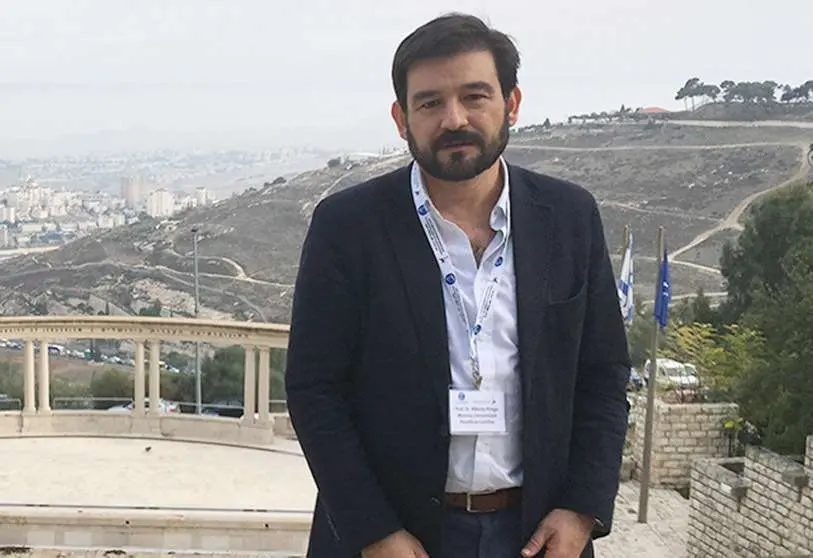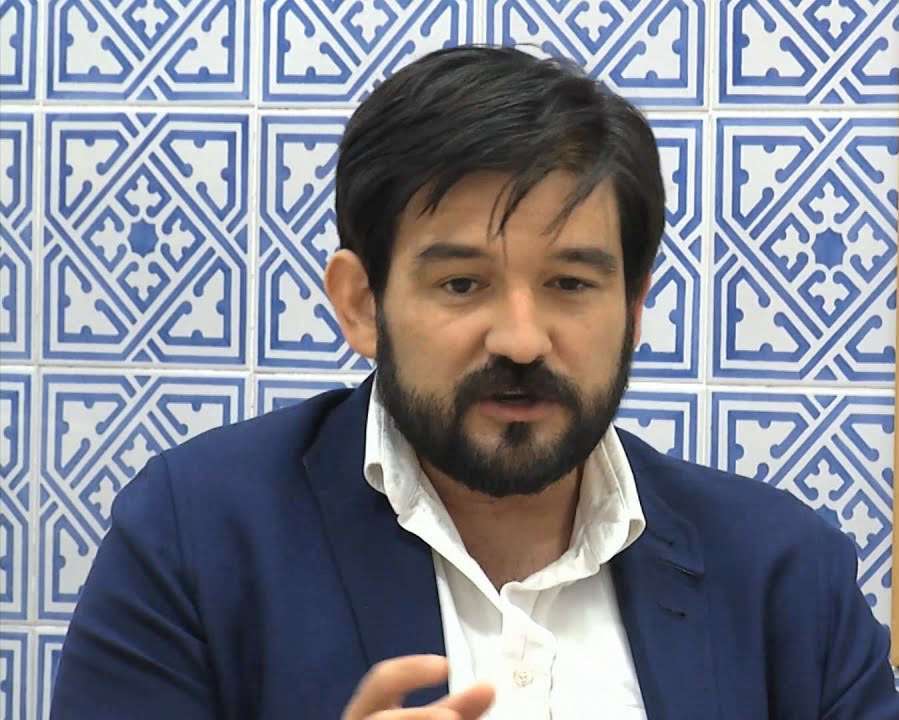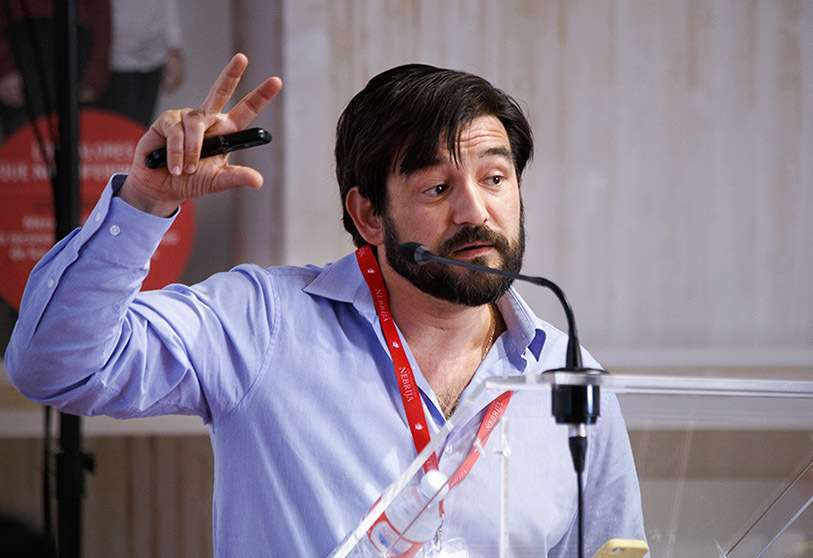Alberto Priego: "Russia has an imperialist spirit that only NATO can stop"

In the latest edition of 'De cara al mundo', the radio programme on Onda Madrid, we had the participation of Alberto Priego, Professor of International Relations at Comillas Pontifical University, who spoke about NATO in relation to the current situation marked by the Russian invasion of Ukraine.
Is there too much ignorance and too many stereotypes surrounding NATO?
There is a lack of positive assessment of what the Alliance has done for Europe in general and for Spain in particular, NATO has been fundamental for us to be able to speak freely right now. NATO has ensured that Europe has remained free since 1949. The problem is that in Spain, because of its late incorporation and its distance from Russia, there is a perception that NATO as an institution serves no purpose except to bomb from time to time, a view that is far from the truth, of course.
It is a political organisation as well as a military organisation....
Indeed, NATO does many things that people don't know about, the first thing is to ensure that we are not attacked, which is the most important thing, to be the umbrella of protection is fundamental, now this is being seen more and more by countries like Ukraine or Georgia, which are not in NATO, have been attacked by Russia. If Poland, the Baltic, Romania or Bulgaria have not been attacked by Russia, it is because they are under Article 5. Beyond collective defence, which is very important for the Alliance, since 1989-1991 it has done many things apart from this type of defence, such as promoting dialogue with the Mediterranean, NATO's Mediterranean Dialogue was a Spanish initiative, civilian cooperation, civil crisis emergency, NATO was the one who watched over the sky in Madrid at the wedding of the King and Queen of Spain, it also monitored the Athens Olympics, it helped the United States recover from the disaster caused by Hurricane Katrina, the Alliance does many other things and that's why it continues to exist.
What is Article 5?
Article 5 is a collective-defence article whereby if a NATO member state is attacked, all other states have an obligation to defend it. It is not an automatic article because it requires members, through their permanent members, to meet at Headquarters in Brussels and say yes, but it is a major deterrent and is the raison d'être of the Alliance.

It should be remembered that the only time it was invoked was by the United States in the aftermath of 9/11.
The only time it was activated was by the United States after 9/11. The truth is that we Europeans were not up to the task, in fact, Luxembourg had doubts for 24 hours as to whether it should be activated or not, and NATO works by consensus, all States must accept the decisions, there is no qualified or unqualified majority. At that time the famous quote from Defence Secretary Rumsfeld came out: "Never again will a war be fought in a committee", Europe did not act as the US had hoped and then we had a crisis of confidence that was resolved when the problems were serious. It is very interesting that the first NATO Secretary General said that NATO was an organisation to keep the US "in", Germany "down" and Russia "out", with some nuances, especially from Germany, that still holds. We Europeans need NATO more than the United States needs NATO and we must have the United States because today we are not capable of defending ourselves and there is a very big threat from Russia, some of us have been saying this for more than twenty years and we have been branded as crazy, but it is clear that Russia is imperialist in spirit and as far as it can it will act and the only thing that will stop it is NATO.
Perhaps in Spain there is no defence culture, since we did not participate in the Second World War, we do not feel the need to have a good defence, but then we all remember Santa Rita when it thunders...
There are several reasons why Spain, or rather its population, is more reluctant to participate in NATO, but one of them is that after the Second World War we were obviously left out of the security structures and our link to those structures was produced by a bilateral agreement with the United States in 1953, and it was not until the 1980s that we joined NATO. It should be remembered that these threats that Russia has made against Ukraine and other states that aspired to be members of the Atlantic Alliance were also made against Spain in 1981. At that time Russia sent letters to all Western chancelleries saying that Spain's accession to NATO would have consequences and even tried to stop it. This highlights the importance of NATO and how important Spain is in the Alliance because we are the Alliance's western mainstay, the ones who close the Mediterranean and a strategic point because we have two coasts, one on the Mediterranean and the other on the Atlantic. The Rota military base is a fundamental base that is essential for NATO and the US, where we have frigates with the capacity to destroy missiles that could come from other places, and we are not aware of this.
The Rota missile defence shield is there for what it is there for. It is curious because when it was installed there was talk of the threat that Iran could pose, but at the real table of operations command, strategy and planning it was known that the possible enemy was Russia.
The first enemy is Russia. Whoever did not want to see it was an ideological or economic question, because Russian money is very juicy and in Spain it has been in several places. There is a question that I tell my students and they are very surprised, and that is that Russia has been wanting to have another base in the Mediterranean for some time, it already has one in Syria, it seems that it has one in Libya, this is not very clear, but it has been wanting to have a base in Algeria for some time, in fact it has already visited facilities in Oran. We Spaniards have to be aware of how close Algeria is, Oran is 219 km from Almeria, a minimum distance, from where short-range missiles can be launched and reach only 580 km from Madrid. If Russia were to install the base it wants to set up in Algeria, Spain would be more fundamental in defending its southern flank. We always think that the southern flank is a flank of non-traditional threats such as terrorist threats, illegal immigration, etc., but we also have elements of traditional 'hard security', and the Alliance is essential in that respect.
Or its intended exit to the Atlantic, its presence in the Sahara and other countries in the region, now the mercenaries of the pro-Russian group Wagner are in the Sahel, we understand that it is not only because Mali could be the centre of operations, but because Putin's objective is to place a base in the Atlantic.
Russia and the Soviet Union always had the basic problem of what were known as warm ports. The invasion of Afghanistan's fundamental objective was to reach the port of Gwadar, in Pakistan, and the agreement with Syria and Russia's involvement in Syria is for the port of Tartous. There is much talk of the offer made by Algeria and the Sahrawi Front to Russia of a port on the Atlantic coast once the Sahara is recovered by the Polisario Front, hence Spain's incomprehensible move to support Morocco more than Algeria when it seemed that the government's line was the opposite. There are things that are being played out at a higher level, and our Foreign and Defence policies are often conditioned by world geopolitics, and the United States, NATO and Russia play a more important role than we realise.

You talk about Spain's not very understandable move to give more support to Morocco; from our point of view, it is not very understandable because of the way it was done, but it is a wise move.
My opinion is that it is a good move, but the President of the Government has had a different policy towards Morocco than other presidents. The first visit a Spanish president makes once he is elected is to Morocco; this time it has not been the case; we have had to wait until this year for this visit to take place. I would have liked the Spanish opposition to have been more supportive of this decision, and I would also have liked the government to have explained this position better, because in the end, citizens are not fools and there must be transparency in the decisions that must be taken. In the end it is more interesting to say that geopolitically it is in our best interest, since Algeria has an alliance with Russia, in fact, its name is the Independent and People's Republic, historically aligned with the Soviet Union, and today they continue with a line linked to Russia, and that can be said, and nothing happens. Some should have been better for one thing and others for another and should have explained to the population the reasons for this shift and the consequences of not having done so.
The big threat in Ukraine is the possible use of limited-range tactical nuclear weapons. Could Russia use such weapons, and if so, how should NATO respond?
I honestly don't think so. I had my doubts at the beginning of the conflict because Putin is unpredictable, but I don't think so. The nuclear weapon is a deterrent, but the deterrent must be credible. For more than six months now, Russia has been threatening to use nuclear weapons with every move we make, and the continued threat undermines the credibility of the threat. In addition, there is a second element that the former head of MI6 talked about recently, especially because we are talking about tactical weapons, if Russia were to use tactical nuclear weapons in Ukraine the effects would be as bad for Ukraine as they would be for Russia because they are two states that border each other. For my part, I think it is more an element of deterrence and threat than a real vocation to carry it out. We must not forget that the US has an anti-missile system in Europe that we do not know if it works, but it seems that it does. Russia does not have such a system, so there is a high comparative strategic advantage in the case of the West vis-à-vis Russia.
Deterrence during the Cold War with long-range strategic nuclear weapons is mutually assured destruction...
Right.








